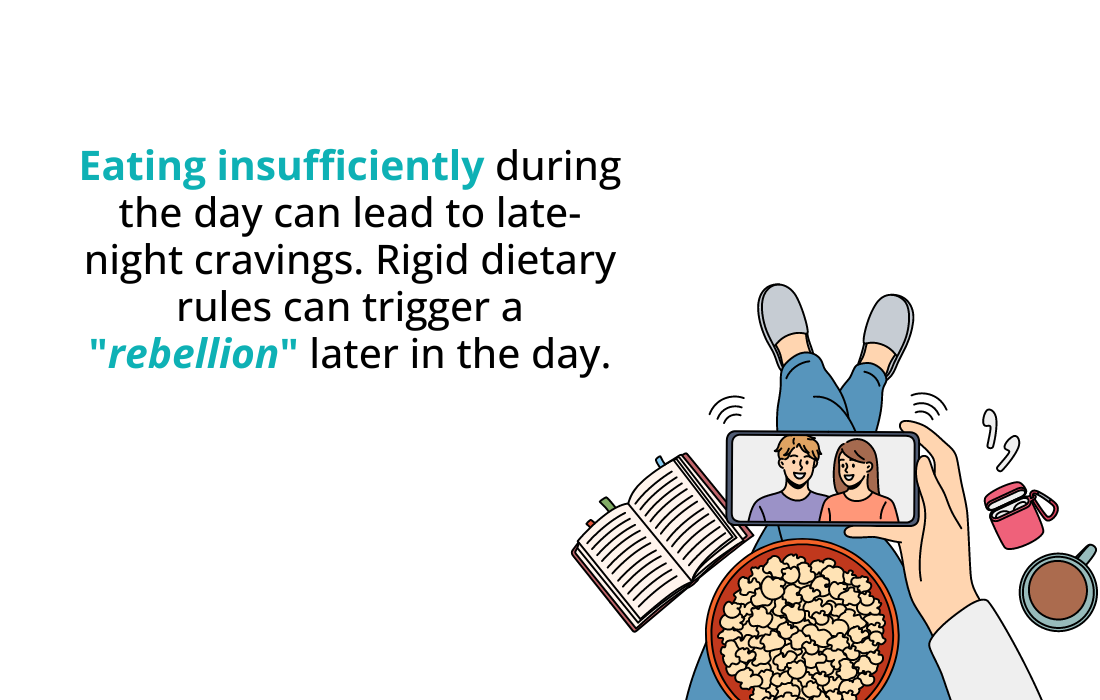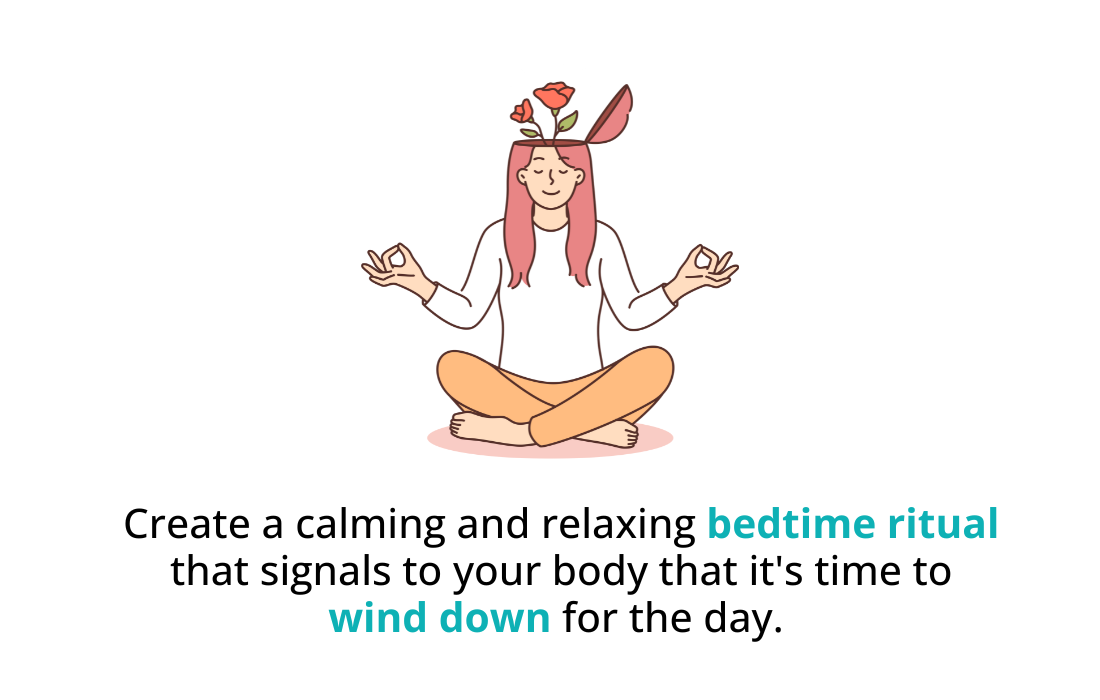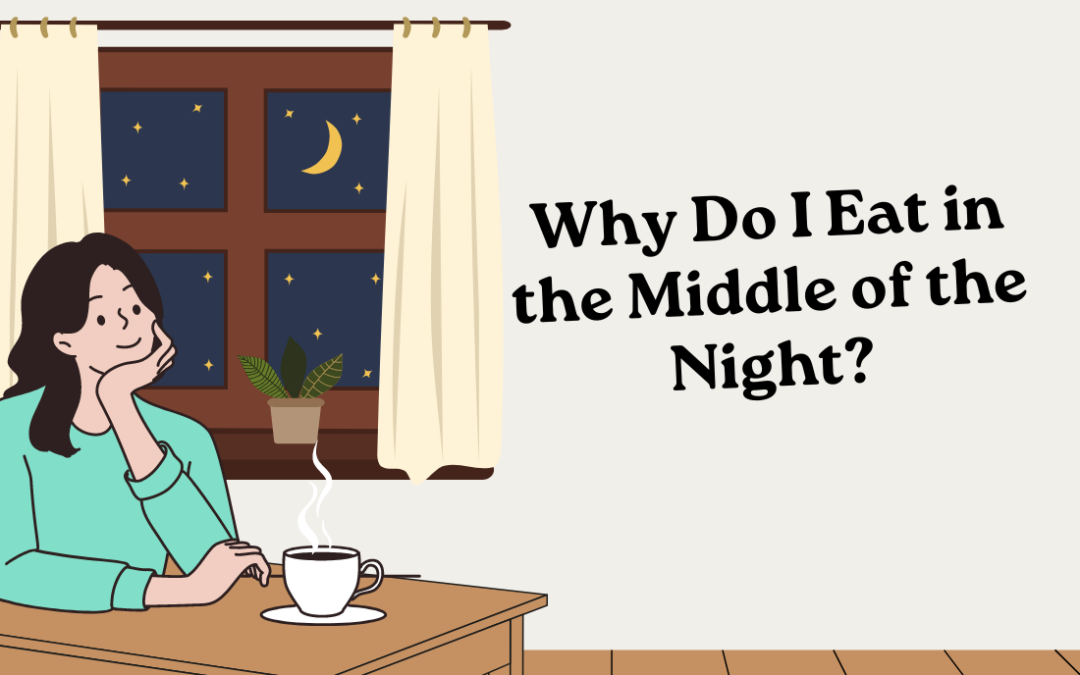I’ve been a coach for a decade now and there is nothing that surprises me around food. I’ve either done it (picked brownies out of the trash to eat), thought it (schemed on who to blame for the binges I didn’t want to admit to), or seen it (night eating included!).
Written by Jenn Hand, Holistic Nutritionist, Board Certified Health Coach & Food Relationship & Emotional Eating Coach, NBC-HWC
Why You’re Eating in the Middle of the Night
I worked with a client who really struggled with eating in the middle of the night.
She would wake up around 3 or 4am and couldn’t resist going to the kitchen to get a snack. She was super frustrated because in her mind, she “knew better” than to eat in the middle of the night. As we explored what was going on, one of the big reasons she was eating was her lack of satisfaction during the day.
She tried really hard to stop eating by 5pm, so she could fast until the next morning.
The problem was, she was hungry when she went to bed, so the more she resisted honoring her body’s signals, the more she struggled with eating in the middle of the night. As we worked to find a pattern that better matched with her body’s needs, she began sleeping through the night with no cravings.
3 Reasons You Eat in the Middle of the Night
What causes us to eat in the middle of the night? There are a few common reasons why this can happen:
1. Emotional eating
Nighttime can often be a challenging time – the day is done, our to-do list has dwindled and we are left with ourselves and our thoughts and feelings.
We stop our busy day and this can bring up feelings of loneliness, stress, or sadness, which may trigger the urge to eat as a form of comfort.
2. Habit
If you’ve developed a habit of snacking while watching TV or scrolling through your phone late at night, your body may start to expect food during these times, regardless of whether you’re truly hungry.
3. Not being satisfied from the day’s food
Not eating enough during the day or not eating foods that you enjoy can leave you feeling hungry later on, leading to late-night cravings. If we restrict, try to follow rigid food rules during the day, or are dieting, this can trigger a “rebellion” later in the day.

3 Tips to Stop Eating in the Middle of the Night
1. Explore non-food solutions
Get curious about what emotions or situations trigger your nighttime eating episodes.
Instead of turning to food for comfort, explore “non-food” solutions to help you cope– journaling, deep breathing exercises, a good cry, a few yoga poses or reaching out to someone you love for support.
2. Create an evening transition
Create a calming, relaxing bedtime ritual that helps signal to your body that it’s time to wind down for the day.
We usually aren’t good at creating “transitions” in our day–signaling that one part of the day is done, as we enter into the next part. Create something that signals to yourself that the day is over– taking a bubble bath, journaling, a warm cup of tea.
Calming activities before bed can help reduce stress and decrease the likelihood of turning to food for relaxation.
3. Eat balanced, eat balanced, eat balanced!
This was one of my main mantras I used when I was working to get out of the binge-restrict cycle.
Aim to fuel your body with balanced meals and snacks throughout the day, focusing on foods that satisfy and nourish you. By satisfying your hunger during the day, you’ll be less likely to overeat at night.
Remember, breaking the cycle of nighttime eating takes time and patience.
Be gentle with yourself as you work towards establishing healthier habits and let go of patterns that no longer serve you.

Common Questions about Nighttime Eating:
Is eating at night a sign of an underlying health issue?
While eating at night can be related to emotional eating or disrupted circadian rhythms, it’s usually not a sign of a specific health problem.
How does nighttime eating affect sleep?
Nighttime eating may impact sleep patterns and contribute to insomnia or poor sleep quality due to digestion and fluctuations in blood sugar levels.
What should I do if I can’t stop eating at night?
If you’re struggling to stop eating at night, consider seeking 1:1 support to address underlying emotional triggers and develop strategies for healthier nighttime habits.
Related Articles
⚪ The Biggest Cause of Overeating at Night
⚪ How to Stop Bingeing at Night
⚪ The Binge and Restrict Cycle and How I Overcame It
Get the Normal Eater’s Newsletter
Join 8000+ women who are overcoming overeating, binge eating, and breaking up with dieting forever. Get Jenn’s inspiring and actionable weekly newsletter with the latest posts, podcasts, and tips on how to love your body, find food freedom, and lose weight holistically.
Get the Normal Eater’s NewsletterWork with an Emotional Eating & Holistic Nutrition Coach
Overcome Bingeing and Emotional Eating, and Break Up with Yo-yo Dieting
Working with an emotional eating coach and holistic nutritionist can help you get free from the frustrating binge and restrict cycle and stop yo-yo dieting.
You don’t have to be obsessed with food or have a million rules around eating to find your natural weight and learn to love your body. Ready to actually see a lasting change and experience true freedom?
Schedule a 20-min CallAbout the Author:

Jenn Hand has been helping women like you become normal eaters since 2015.
She’s worked with thousands of women, helping them to balance their bodies, end bingeing, stop obsessing over food, and start feeling amazing again. As a board-certified health coach and holistic nutritionist, Jenn knows how to support you in making real positive changes that last.
Her articles have been published on Mind Body Green, Tiny Buddha, Thrive Global and other local and global media platforms. She’s the author of How to Be a Normal Eater and the creator of The Normal Eater’s Club program. Listen to Jenn’s advice and tips on the Cake Doesn’t Count Podcast, or read more of her articles for free on the Food Freedom Blog.
Learn About Coaching!





